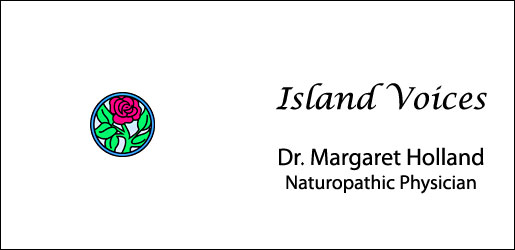Dr. Margret Holland December 2008
Current Article ∙ Archive ∙ Back to Island Voices
Reactional Mode 1
A Brief Description for Defining Health and Disease
By Dr. Margret Holland, B.Sc., N.D.
Last month we introduced the concept of naturopaths categorizing their patients in order to decide on the best treatment protocol for an individual’s complaint. This month we will explore the first of these categories – Reactional Mode 1 (RM 1).
If you recall this mode, along with RM 2, falls into what is referred to as a functional disease state. Functional disease is relatively easily reversed because there has been no permanent physical change to the organs of the body. An imbalance has occurred from a stimulus, but the immune system is still present and healthy enough to be able to respond to that stimulus and eradicate it.
Reactional Mode 1 refers to a hyper-reactive syndrome. This means that the patient experiences a sudden onset of symptoms often with a violent reaction to the stimulus (i.e. virus, bacteria, stress or injury). All the components of healing are called into action, often with quite volatile expression. This is where we hear patients discussing that the illness almost killed them, or that it came on so fast they didn’t know what hit them. Their vocabulary directly represents the rate of reaction: fast, quick, burning, sharp etc. They may be the type of person who has quick flares of temper whether related to an illness or not. They may be quite energetic but display a somewhat unstable emotional state with quick changes from one mood to the next. They tend to be quite active, maybe even restless. They don’t tire easily. They are more hyperactive in the evening and tend to be a little sluggish in the morning on waking – at least until they get going. In short, these patients have much energy and are able to respond quickly and effectively to situational changes. These people may actually verbalize that they do not have the time to be sick.
In children this R.M. may express as acute asthma, eczema or allergies. In adults it may present as gastritis, hyperthyroidism, they may also have hypertension. Females may complain of excessive bleeding with their menses or uterine fibroids. Migraines may be experienced by any of the people in this group.
Overall these are generally healthy patients, but they have their challenges. Their lifestyles tend to result in “burn-out” over time. They find the frequency and duration of their illnesses increases.
Next month we will explore RM 2 and its idiosyncrasies.
Dr. Holland can be reached at (250) 752-2732 or #3-702 Memorial Avenue, PO Box 564, Qualicum Beach, BC. V9K 1T1.
For a consultation, please call me at 752-2732.



![holland-4colourcircle[1]](http://seniors101.ca/wp-content/uploads/2011/05/holland-4colourcircle13.jpg)